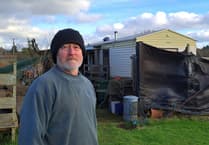A MONMOUTH family who emigrated to Tokyo in 2007 have described how they're fleeing their city home following advice from the British Embassy over the increasing nuclear threat in Japan.
For over a decade Alfie Goodrich, 41 was press officer with world renowned Nimbus Records based at Wyastone just north of Monmouth. His mother, Eileen, was both a Monmouth Town and county councillor and was awarded the MBE posthumously after dying from Leukaemia in 2005.
Since 2007 Alfie has been living in Tokyo with his Japanese wife Hiromi, 40, and their three children Joe, 10 and Ami aged eight, who both attended Osbaston Primary School before the family emigrated, and their new baby Charlie.
Mr Goodrich told the Review that following British Embassy instructions for ex-pats to leave Tokyo, the family is moving to a friend's house in Yokosuka, south of the capital. He believes this will be a good base for the family to move further south as the nuclear situation continues to be uncertain.
In his own words he describes the tumultuous after effects of the earthquake which hit Japan causing a Tsunami which has wiped out towns and left thousands dead.
"Friday March 11 began pretty much like most other days, by getting the children off to school and going about some of the usual morning chores and getting a few bits and pieces of work done on the computer ready for what promised to be a long day and night.
As part of my work I undertake photowalks around Tokyo and this one promised to be a lot of fun: walking across town starting at midnight and walking 'til dawn.
That afternoon I had just settle down to doing some editing when the building started shaking. I looked up at the lampshade in my office and it was starting to sway pretty well. When it carried on swaying for longer than normal I stopped typing and stood up.... when things keep going past five seconds of swaying, that's when I start to mentally prepare for what could always happen next.
After living in Japan for well over three years now, I'm kind of used to earthquakes and the little ones rarely have me raise an eyebrow. But after a large-ish tremor in Tokyo a couple of years back – just before the massive quake that devastated parts of China – I decided to get a couple of large rucksacks, pack them full of useful gear and stash them in a cupboard just in case.
That's my way of dealing with living in the world's most earthquake-prone country. You can't sit around worrying, you have to live with it. The best way of sleeping safe at nights is to know you are ready for anything that mother-nature might decide to throw at you one day.
But after a few initial tremors which had turned into minutes, Hiromi stirred from the bedroom with our baby. She'd opened the sliding window onto the balcony as it's usually good to even out pressure on the building by opening doors to the outside.
'This is getting worse' I told her and we're getting out now.' As we left we met our older children coming into the building and I noticed there was a clock on the floor that had fallen from the wall. The kitchen floor was covered in stuff too. The lampshade on the ceiling of the living-room was swinging more violently than I had ever seen before. That lampshade is my canary-in-the-coalmine.... my barometer of seismic activity.
I ran back in to retrieve from the cupboard the rucksacks that had been prepared for quakes. If we needed to stay out, then we had everything we needed for a couple or three days.
We headed down the stairs, all eight flights of them. By now the building was really swaying each time we rounded the next flight we could see people running towards the park near our building. It's not so big a park but it's in the clear from falling buildings.
We joined the gathering throng as all of the office staff from nearby buildings had also emptied out into the park. We put bags down and started to collect ourselves a little. Everyone looked scared.
Some time had passed when the first of the aftershocks came and it was as violent as the first quake. I've been in a variety of places during quakes – up in tall buildings, five-floors underground on a subway platform – but nothing had prepared me for what happened during the second set of tremors....
When you live eight floors up, you get a good feeling when you get outside, downstairs and on terra-firma during an earthquake. Last Friday's second quake took that away from me when the park bench I was sat on started shaking violently too, almost violently enough to shake me and Charlie off. I'd never experienced that. Terra was no longer firmer. I looked at the old lady next to me ....
'Hajimete mitai', she said, which translated means 'First time I've seen this. She told me she had lived in the neighbourhood for 30 years and had never experienced sensations like this.
We stayed in the park for about an hour and a half, finally going home when it was obvious not only that we would be more comfortable there as most of the office staff from companies on our block had also gone back inside. Plus, we'd by now heard about the tsunami in the north of the country.
We live one mile from Tokyo Bay. We began to go over the options: stay inside a building well proofed against quakes. By now the first visual reports of the devastation up north were beginning to come in and left us numb. Places Hiromi and I both knew. Her family in Fukushima, situated just behind the front-line of the trouble, was safe apart from her father's house which is no more but he himself escaped and is fine.
After what seems a lifetime, but is less that a week we are still getting repeated and frequent aftershocks. Added into that are new earthquakes in various parts of the country, the most recent one just 90miles away and right next door to Mount Fuji.
We're a little scared, a little stressed and we are tired. Other than that we are fine; warm, healthy, undercover and with those we love.
The images we – and you – are seeing from the north of Japan are heart-rending. More so for us and for anyone who knows those parts of the country; the sleepy seaside towns, with their racks of sun-drying fish and little train-lines which wind along the coast.
I find myself welling-up with tears at the merest thought of remembering these things. For those of you in Monmouthshire reading this, imagine the south coast of England – from Dover to Devon. All those lovely places, the beaches, the towns and villages you holidayed in or live in.
Now imagine walking inland 5km. Turn around to look back towards the coast. Now fill that view – from where you are standing all the way back to the beach – with smashed houses, cars, boats, the stench of destruction..... and nothing taller than a single storey still standing. Now you might be getting close to being able to imagine what is going on in Sendai, Miyahi and Fukushima."
---------------------------
"The immediate future for us is that we are staying in Japan. This is our home. We are not running away unless Japan's situation gets so dire that it is the only option. And by 'so dire' I mean a true apocalypse; massive earthquakes, tsunamis and the whole island tipping into the Pacific.
However following advice from the British Embassy we are temporarily leaving Tokyo as the advice for Brits is to leave Tokyo before panic sets in, or the situation worsens.
We are heading a little south to a friend's house located near the US Navy base in Yokosuka. The Embassy's rationale being it's better to get out of downtown Tokyo before everyone is trying to. We have wheels but petrol is scarce. We are safe but just making our situation a little future-proofed by leaving Tokyo.
The children all okay, but we the adults are all a bit stressed, so keeping everything 'normal' at home is a challenge. The kids have seen some of the footage from the aftermath but we have been keen not to show them too much but enough to reinforce what safety messages they get from regular drilling at school: when warnings come, act immediately and do what you are asked to when you are asked to.
The children are well drilled in earthquake and tsunami procedures here. It's an everyday fact of life so we are all prepared for things.
Northern Japan will need help for years. I have a bus/truck licence here and speak Japanese and I have had many offers already for me to help the clear up operation.
Long after the international news journalists have left, there will be plenty of work needing to be done beyond the media scrutiny. It's quite a moral dilemma: stay in Tokyo with my family or go and help with the relief operation in the north. I'm staying put for now. I will go north to help when it's appropriate.
---------------------------
JAPANESE people are strong. They have rebuilt before and they will do so again. Disasters often bring out the worst in some people. There is a lot of political posturing going on outside of Japan as well, over the wider issues of nuclear power in Germany and the USA.
Traders are making their own little packet on the whole episode. Many foreign companies and embassies here have been contributing to a swell of mis-information which has been ratcheting up the tension here in Tokyo.
We have to return to some sort of normality. It's tough. We are lucky to have all the trappings of normality still intact and around us. But in some ways it is all just a veneer of normality and underneath that veneer is an undercurrent which Japan and specifically Tokyo probably hasn't felt for a long time: if this Big One is coming, maybe it's coming sooner rather than later.
Internet communication in Japan and to the UK on the whole is good but telephones have been intermittent since last week's quake and at moments of high load on the networks like when there are large aftershocks. However landlines are iffy and calls on mobile networks ditto. The mobile 3G connection has never gone off so its iPhone for email, Twitter and Facebook.
Shops are getting empty of essentials here in Tokyo. Rice is low, as is bread and petrol. Part of the problem is distribution and part may be a little over-buying by panicky people and part of it is as a result of convenience stores and supermarkets sending goods up north to help with the requirements in the worst effected areas.
Fear and misinformation are the by-products of the convenience and power of the internet. There have been a lot of scary non-stories and rumours spreading, including some by people who should know better...
A lot of foreigners have left or are leaving Tokyo, either because of their companies actively pulling them out or because they personally have decided to leave.
Those who have left Tokyo for places inside the country seem to have gone south... a decision that may have seemed a little less solid after the most recent new earthquake in Shizuoka near Mount Fuji and about 90miles from Tokyo.
Community spirit is good but people are on-edge there is no doubt. Up north the situation is dire. Its cold and snowing in most of the tsunami effected areas. That may help with issues of bodies decaying and spread of disease which may have been an issue in the Asian Tsunami in Thailand Indonesia a few years back. But, it's making life hard for people."





Comments
This article has no comments yet. Be the first to leave a comment.